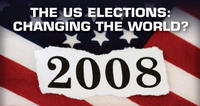The US Elections: Changing the World?
This year, the US elections are more exciting than ever. But once the fanfare of the elections is over and the chosen leaders are in place, will the world have undergone any real change? Perhaps it’s time to think about changing the people who are really running the show – ourselves
History in the Making
On November 4, Americans will flock to local community centers, fire stations and other venues to participate in a rite as old as the country itself: the opportunity to select the next President of the United States. History will be made this year. For the first time, there will either be an African-American or a woman in the White House.
The election will be tightly contested, but what are the real differences between the candidates? The key issues that they address are the same: the war in Iraq, dependence on foreign oil, and a troubled economy. And of course, there are always issues related to employment, health care and the environment.
While their solutions to these issues differ, each candidate honestly believes that he is the one who can bring the country back to a position of prosperity, power, and global respect. Both agree that the policies of the past decade have severely injured America’s standing in the world court of opinion. As a result, each proclaims himself the “agent of change” that can unite the country and the entire world.
A Tradition of Change
An old adage says that the only thing that is constant is change, and despite current rhetoric, change is nothing new in American politics. The founding fathers were probably the most radical proponents of change when they created a country dedicated to “Life, Liberty and the Pursuit of Happiness,” one where “All men are created equal.” Yet even with all the change that has taken place since that time, today we still face many of the same problems that we faced then: conflicts abroad, economic troubles at home, discrimination, and oppression of minorities.
If two hundred years of history have shown us that various policy changes do not create a happy, united country, and if keeping the status quo means a growing sense of polarization between citizens and an economy that continues its downward spiral, then isn’t it time to do something fundamentally different? We must look for new, genuine solutions to the same old problems.
All of the changes that have occurred thus far in history have had a common thread: they’ve all tried to “fix” something in the external world. Discrimination? We will force desegregation upon the populace. Poverty? We will institute social security programs and elaborate systems of taxation. Environmental crises? We will legislate clean air, protection of endangered species, and resource utilization. The list could go on and on. We have a “fix” for every problem. But for some reason, each “fix” only seems to generate new and greater problems.
What Really Needs Fixing?
Kabbalah says it point blank: it is impossible for any world leader to make a lasting improvement by “fixing” something in the external world. Any change that’s made by intellectual, moral or physical power will not result in lasting improvement. Moreover, the leaders themselves are the products of their society; thus, it is unrealistic to expect a leader to know how to fix our problems. Change must start from the masses, rather than from the leaders. In other words, it is ourselves that we need to “fix,” not our leaders or anything else out there in the world.
Kabbalah explains that Nature itself is the model with which to align ourselves. The world was designed to operate in balance and harmony, with each element working for the well-being of the whole. Everything in Nature operates in accordance with this principle - everything except us. Man is the only creature that consciously works for his own benefit and at the expense of others. It is this egoistic attitude toward reality that is the root of all our world problems.
However, changing our egoistic attitude is not at all a psychological matter. It is an actual development of a new sense within us, a sense that will lift us above our egoistic perception. We will then reveal our connection with each other within one integral system - one living and breathing human organism.
The methodology for this inner transformation is rooted within Nature itself, and it was discovered by people just like us. From their perspective, it is evident that all people will have to discover that they are interdependent parts of one whole, and therefore change their egoistic attitudes toward each other.
Agents of Change
All of our current crises will vanish as humanity begins working as one body and comes into harmony with the rest of Nature. While it may still sound utopian to us, Kabbalists tell us that it is a foregone conclusion, and if we don’t realize this, then social, environmental and political catastrophes will force us to realize how destructive our egoism is. At that point, we will start working together simply to avoid the incredible suffering.
That’s where the wisdom of Kabbalah comes in, allowing us to recognize the true structure of the world and to identify man's role in it. By studying this structure, we will be able to change our society by changing ourselves from within. Then, we will truly be the “agents of change.”
